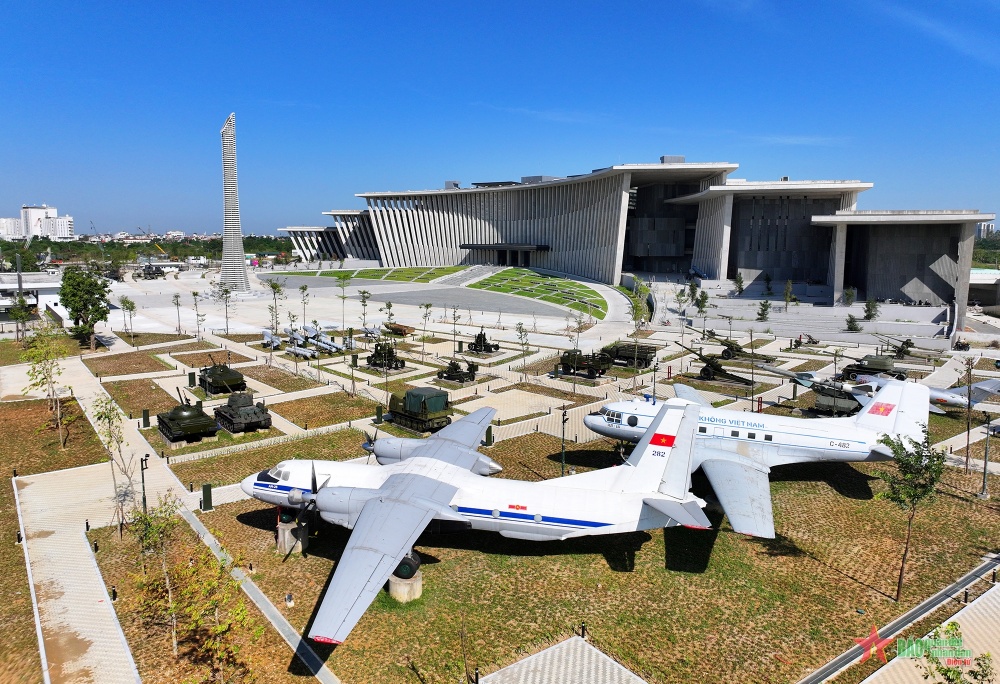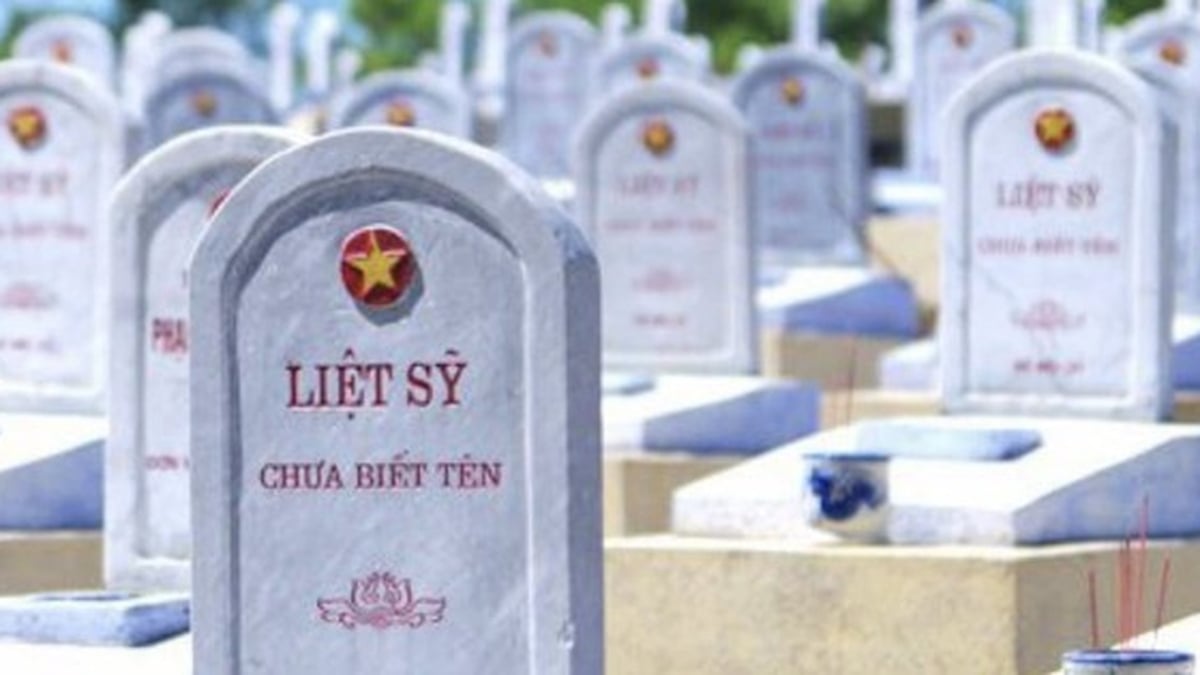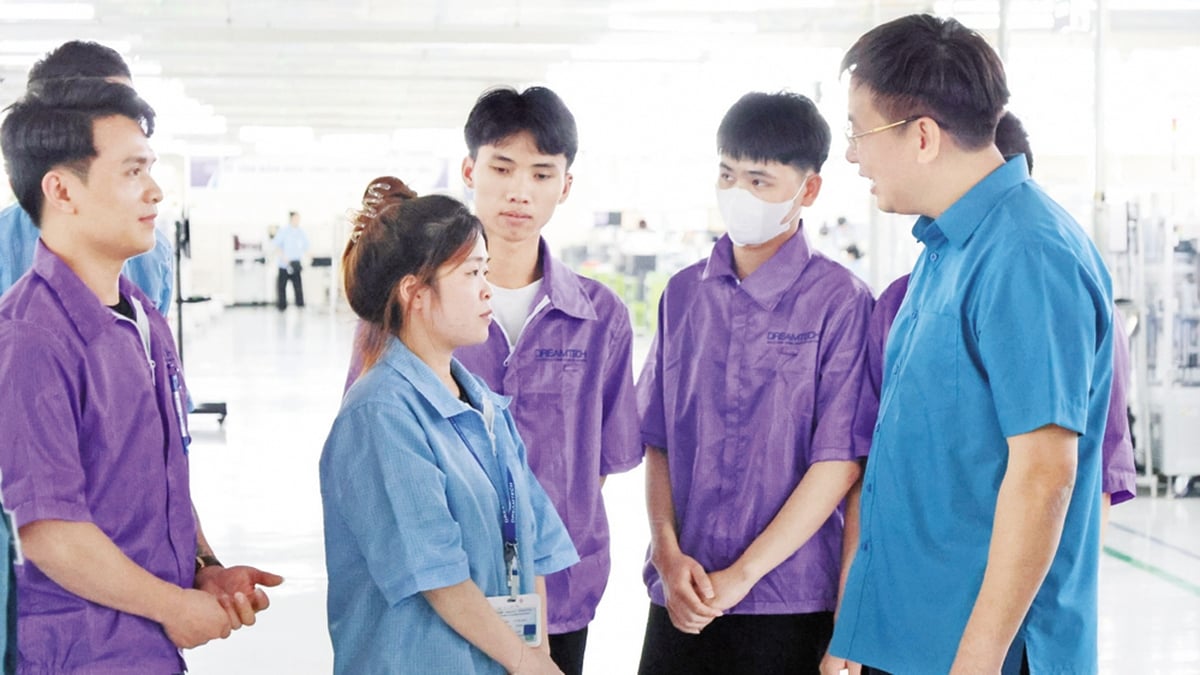After nearly a month of opening to visitors, the Vietnam Military History Museum has attracted a large number of domestic and foreign tourists. It is known that the museum will be open free of charge until the end of December this year.
Home to more than 150,000 artifacts
The Vietnam Military History Museum has just been inaugurated at Km 6+500 Thang Long Avenue (Tay Mo, Dai Mo Ward, Nam Tu Liem District, Hanoi). The Vietnam Military History Museum was newly built by the Ministry of National Defense in 2019, on an area of 386,600m2. The museum currently holds more than 150,000 artifacts, including 4 national treasures and many valuable artifacts.
The newly built museum has a modern, multi-functional design. The museum architecture is not simply a work displaying the history of war, but also creates a common space for visitors to interact and experience the struggle for national independence of the heroic Vietnam People's Army.
In addition, the museum applies many new display methods, combined with 3D mapping technology; information lookup screen devices, photo media, automatic audioguide and QR code to look up information about artifacts, images and more than 60 video clips introducing campaigns, battles and historical figures, bringing visitors a completely new experience.
 |
| Display outside the Vietnam Military History Museum |
The new look of the Vietnam Military History Museum is impressive. The museum building stands out with its front yard and the 45m high Victory Tower, symbolizing the year 1945 when President Ho Chi Minh read the Declaration of Independence giving birth to the Democratic Republic of Vietnam, now the Socialist Republic of Vietnam, along with the museum building consisting of 4 floors above ground and 1 ground floor, with a construction area of 23,198m2. The total floor area of the main building is 64,640m2, with a total height of 35.8m.
The right and left wings are the outdoor exhibition areas. On the left side, weapons and equipment used by the Vietnamese army and people in the resistance war against the French and American invaders and in training and combat readiness during the period of national construction and defense are displayed. Typical examples include: 85mm cannon; 57mm anti-aircraft cannon; PT67 tank number 555; MiG 17 aircraft number 2047; SU22 aircraft...
On the right side of the museum are displayed weapons and equipment used by the French and American armies during the war of aggression against Vietnam, including: artillery, infantry fighting vehicles, tanks. In particular, there is the M-107 175mm self-propelled gun known as the "King of the Battlefield" along with many types of aircraft left behind by the US army after the war such as A37, F5E, CH47, C130 and dozens of types of bombs used by the US army during the Vietnam War.
In the space on both sides of the building is a symbol of the desire for peace with tree branches, green shoots and doves flying up from the plane wreck.
This is a symbolic display introducing Vietnam's desire for Peace and understanding the value of Peace to countries around the world. The globe and mirrors reflect the history of building and defending the country of the Vietnamese people from the Hung King - An Duong Vuong period to the 20th century, thereby affirming that since ancient times, the Vietnamese people have desired peace; and have accepted hardships and sacrifices of blood and bones for the country to be independent, free, and for the people to be prosperous and happy.
Passing through the main hall is the display of the “Silver Swallow” MiG-21 with serial number 4324. What impresses and surprises visitors is the giant MiG-21 hanging on cables attached to the roof, creating the feeling of taking off to protect the sky of the Fatherland.
During the resistance war against the US to save the country, there were 9 pilots flying the “Silver Swallow” 4324, which made 69 sorties, encountered the enemy 22 times, fired 16 times, and shot down 14 US aircraft. On the fuselage of the MiG-21, there were 14 red stars, symbolizing the 14 enemy aircraft that were shot down. This aircraft was recognized as a National Treasure by the Prime Minister on January 14, 2015.
The exhibition space inside the museum on the first floor is divided into 6 themes. Theme 1: The early days of building and defending the country; Theme 2: Protecting independence from 939 to 1858; Theme 3: Fighting against French colonialism, gaining national independence from 1858 to 1945; Theme 4: Resistance against French colonialism, 1945 - 1954; Theme 5: Resistance against the US from 1954 to 1975; Theme 6: Building and defending the country from 1976 to the present day.
The large space of the new museum not only displays artifacts but also introduces many valuable documentary images of important meetings that decided the victory of the Vietnamese revolution; the process of organizing and fighting of units, providing visitors with an overall and detailed view of the events.
Museums should not be turned into "canvas"
In recent days, at its peak, the museum has welcomed a record number of visitors, up to 40,000 people. Attracting a “record” number of visitors to the museum is a cause for celebration. But amid that joy, sadly, many people lack awareness when coming to a place that requires seriousness like the museum.
For example, a few days ago, public opinion was stirred up by a girl climbing onto the roof of the Vietnam Military History Museum to pose for a video and take photos. The clip, after being posted on social media, attracted the attention of many netizens. In the first few days of its opening, not only the girl above, but also a number of other people climbed onto the roof of the Vietnam Military History Museum to take photos and check-in.
As soon as the incident was discovered, the Vietnam Military History Museum said that all entrances not in the open exhibition area had been roped off, barricaded, and had signs stating "No entry without permission".
From the museum's side, because it has just started operating, it is inevitable that there will be some mistakes, so there are "gaps" for some people to take advantage of, climbing on the roof, or hanging on, touching the exhibits, climbing on the exhibits to take pictures... Currently, many measures have been tightened by the museum to prevent inappropriate behavior from visitors when coming to the museum.
In response to the excessive behavior of some visitors, most opinions have criticized the act of climbing on the roof of the museum, or clinging to artifacts... Some opinions say that this reveals the "canvas" lifestyle of some young people when they disregard safety, disregard regulations to deliberately find strange angles and shooting angles to attract views. In addition, some parents let their children cling to tanks, also showing that they do not comply with museum regulations. An online account was indignant: "When entering a history museum, both parents and children are unconscious. Parents are thoughtful adults, if they visit such places but have zero consciousness, how can their children become good people?"
Museums are places to display artifacts, many of which are precious and have historical value and need to be preserved. Museums are also places to remind people of the origins of national history. Going to museums in large numbers is a good thing, but going to museums just to satisfy personal ego or to show off is not a good thing. From the above story, it is time for families and schools to teach children some skills when going to museums and public places. If families occasionally take their children to exhibitions and museums, they will surely have more necessary behavioral skills. If schools, instead of organizing lavish, repetitive and expensive field trips, take children to museums and exhibitions, it will certainly help children understand more about the history and culture of the nation. Habits should be formed from a young age, instead of being led by social networks every day...
Source: https://thoibaonganhang.vn/hinh-thanh-thoi-quen-van-hoa-khi-toi-bao-tang-158187.html






















![[Photo] National Assembly Chairman attends the seminar "Building and operating an international financial center and recommendations for Vietnam"](https://vphoto.vietnam.vn/thumb/1200x675/vietnam/resource/IMAGE/2025/7/28/76393436936e457db31ec84433289f72)













































































Comment (0)